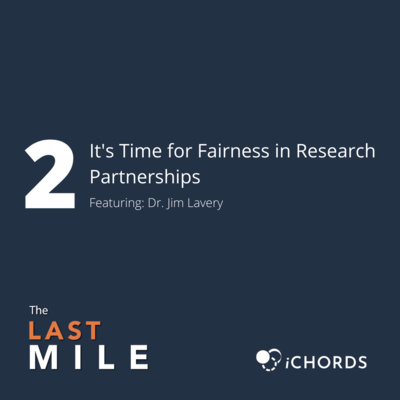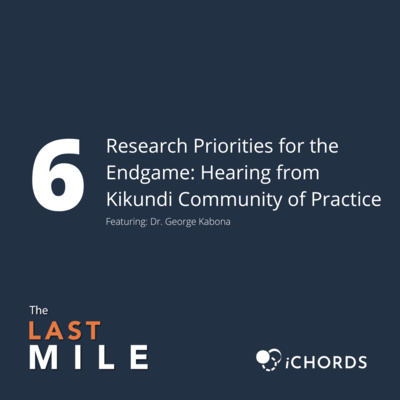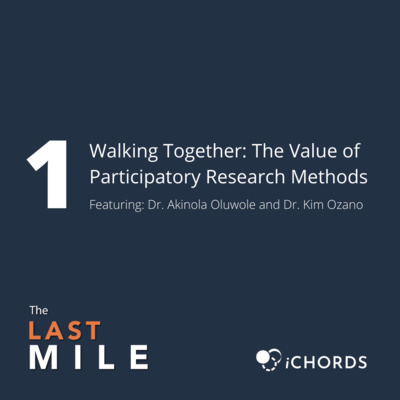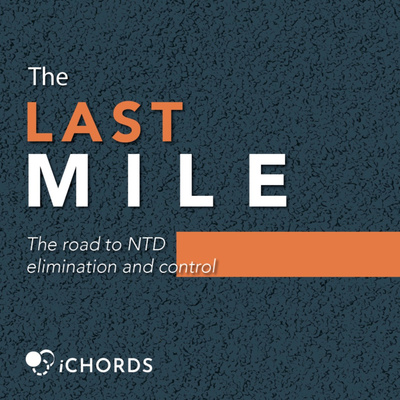
The Last Mile
By iCHORDS
Join us as we interview guests from across the NTD community, hearing their stories, and how the work they are doing contributes to the last miles of NTD elimination and control.

The Last MileDec 14, 2021

Using public health economics in the fight against NTDs.
Economic terms such as effectiveness and efficiency are often used when evaluating programs, but what do these terms really mean? Tune in to hear Dr. McFarland from Emory University, and Dr. Dalaba from the University of Health and Allied Sciences, as they discuss the role that public health economics has in the fight against NTDs.
A full bio for Dr. McFarland can be found here.
A full bio for Dr. Dalaba can be found here. Links to more resources:
- Centers for Disease Control and Prevention (2023)
- Edwards et al., (2013). Public health economics: a systematic review of guidance for the economic evaluation of public health interventions and discussion of key methodological issues
- Turner et al., (2019). Economic evaluations of onchocerciasis interventions: a systematic review and research needs

Using qualitative research methods to enhance MDA
Join Dr. Margaret baker, Dr. Beth Sutherland and Dr. Gemma Aellah to learn about the value and utility of qualitative research methods to enhance MDA.
The guide featured in the podcast can be found by following the link: https://www.ntdtoolbox.org/toolbox-search/guide-improving-mda-using-qualitative-methods
Speaker bios:
Gem Aellah is Research Fellow in Health and Social Science in the Global Health and Infection Department at Brighton and Sussex Medical School, UK. Gem is part of the Social Science for Severe Stigmatizing Skin Neglected Tropical Diseases Foundation, a collaborative NIHR-funded research partnership across UK, Ethiopia, Rwanda and Sudan, aiming to end the neglect of three skin-NTDs, podoconiosis, mycetoma and scabies, through bringing the social sciences to bear on these conditions. Gem has a broad-based social science background and takes a practical anthropological approach, bringing social science on pressing global health issues together with creative methods and outputs, spanning non-specialist and interdisciplinary audiences. Her current work uses anthropological methods to explore how skin-NTD policymaking happens. Previous work involved ethnography of everyday life within a Kenyan Health and Demographic surveillance site during scale up of HIV care and treatment. She is co-author of creative handbook of tools to help global health workers talk about uncomfortable ethical dilemmas when doing research and intervention across inequalities. Gem @jachunya
Elizabeth Sutherland received her doctorate in Maternal and Child Health from the Gillings School of Global Public Health at the University of North Carolina at Chapel Hill. She has worked in program evaluation and implementation science research for more than 15 years and has worked in a wide variety of health areas. Dr. Sutherland is currently employed at RTI International, serving as the Evaluation and Research advisor for the Act to End NTDs | East project.
Prof. Maggie Baker is an associate professor in the Department of Global Health at Georgetown University in the USA. The daughter of Scottish parents, she was born and grew up in Lima, Peru. Her research focuses on increasing access to infectious disease programs, including for neglected tropical diseases (NTDs). She takes an implementation science approach, using multidisciplinary approaches, and is highly published. With over twenty years of global health experience, she has also worked at RTI International (most recently as the technical director of USAID’s large Act to End NTDs | East program, focused on supporting countries in Africa, Asia, and Haiti), with the UK government, and has spent five years embedded within the national government lymphatic filariasis program teams in Vanuatu and the Dominican Republic.

Using Outcome Harvesting to evaluate NTD programs
In this episode we hear from Geordie Woods from Sightsavers and Mack Giancola on how they used a participatory evaluation approach called: Outcome Harvesting to evaluate the Accelerate trachoma elimination programme.
Full speaker bios:
Mack Giancola has 15+ years of experience as an educator, public health leader, and evaluation consultant. He specializes in participatory evaluation approaches like outcome harvesting by combining qualitative and quantitative approaches with facilitation and sense-making.
He is currently wrapping up his dissertation at the University of Illinois Chicago School of Public Health, School of Public Health Leadership.
Geordie Woods is a technical advisor on neglected tropical diseases for Sightsavers, focusing on social and behavior change communication and the integration of water hygiene and sanitation programing into NTDs programs. He works with multiple organizations across these sectors, spearheading innovative partnerships. His areas of expertise include strategic communication design, mass media and community mobilization, and advocacy. Geordie was a Peace Corps volunteer in Guinea and worked subsequently for years in West Africa with Johns Hopkins Bloomberg School of Public Health. He has an MPH from Tulane University School of Public Health and Tropical Medicine.
Additional Resources:
Sightsaver's Accelerate trachoma elimination programme

Let's focus on focus group discussions
This episode of the Last Mile Podcast will discuss how to conduct a successful focus group discussion with Dr. Doris Njomo from the Kenya Medical Research Institute, and Naomi Caplan and Dr. Mekuriaw Alemayehu from the NALA foundation.
Here you will find the link to the Beyond MDA report that is discussed in the podcast: https://www.nalafoundation.org/_files/ugd/50e284_2a0cef39ca2745c1a38fd3d16bc277a3.pdf
Here is a link to a quick guide on focus groups: https://www.ichords.org/ichords-research-methods-series-focus-group-discussion/
Full Speaker Bios:
Dr. Doris Njomo is a Principal Research Scientist in the area of social and behavioural studies at Kenya Medical Research Institute. Amongst other researchers, she has been conducting implementation research studies for Preventive Chemotherapy NTDs using mixed methods approach for over 15 years and has published several manuscripts and mentored postgraduate students on qualitative research methods.
Naomi Caplan is the Head of Learning & Innovation at NALA. Previously a teacher, her interest in addressing the root causes of poverty led her to pursue a career in public health. With an MSEd and MPH, she now oversees NALA’s educational arm, which includes designing assessments that inform, evaluate, and amplify the work.
Dr. Mekuriaw Alemayehu holds a PhD in public health, focused on visceral leishmaniasis and co-infection with HIV. He is currently a project manager for NALA Foundation as well as a postgraduate director and principal investigator of different projects at Gondar University in Ethiopia. Mekuriaw has 13 years of experience working with governmental and non-governmental organizations, including the WHO.

Exploring Rapid Ethnography to Improve Community Programs
In this episode, we will be learning about Rapid Ethnography to get a better understanding of how this kind of research methodology can help us control and eliminate Neglected Tropical Diseases. To help us navigate this topic, we have brought on two special guests, Dr. Padmalochan Biswal and Dr. Satyabrata Routray.
Podcast Guests
- Dr. Padmalochan Biswal
- Dr. Satyabrata Routray.
Podcast Host(s)
Podcast Narrator and Producer:

Research Priorities for the Endgame: Hearing from Kikundi Community of Practice
iCHORDS Community of Practice is a platform for communication, collaboration and knowledge exchange within social and behavioural science research disciplines to address implementation gaps and current issues facing Neglected Tropical Disease programs. Given this, It is extremely important for iCHORDS to work together with other partners to understand challenges that are faced within communities so we as researchers can be responsive to needs.
Today we will be speaking to the Chair of Kikundi Leadership Council, a Community of Practice for NTD Program Managers in Africa - to learn more about some of the dynamic needs program managers are facing in the field.
Podcast Guests
- Dr. George Kabona
Podcast Host(s)
Podcast Narrator and Producer:
Resources:

Leveraging the Power of Campaign Integration to Improve NTD Programs
Health campaigns are defined as time-bound, intermittent activities that deal with particular epidemiologic challenges, quickly close delivery gaps or offer supplemental coverage for health initiatives. Integrating health campaigns can be used by programs and organizations to enable co-delivery and collaboration among public health efforts with the goal of improving the efficiency and effectiveness of several interventions. The notion of integration is especially salient in the WHO NTD 2021-2030 roadmap which emphasizes the need for cross-cutting approaches which include improving integration across NTD programs.
Given the importance of mass drug administration as a health campaign to control and eliminate some of the neglected tropical diseases, we set out to learn more about leveraging the power of campaign integration to improve NTD programs. In this episode, we speak to Mariana Sarmiento & Dr. Eva Bazant.
Podcast Guests
Podcast Host(s)
Podcast Narrator and Producer:
Resources:

Implementation Research: Rethinking Our Approach to NTD Research
Implementation Research (IR) is a systematic approach that recognizes, understands, and addresses implementation bottlenecks and identifies optimal approaches for implementing health interventions, strategies, and policies.
IR helps us improve our understanding of the challenges we face in the real world by enhancing our understanding of how real-world factors impact implementation. By doing so, IR sheds light on the intersection between what can be achieved in theory and what happens in practice.
Given the importance of IR as a tool to improve interventions in the neglected tropical diseases field, we set out to learn more about IR from Dr. Margaret Gyapong and Dr. Olumide Ogundahunsi.
Podcast Guests
Podcast Host(s)
Podcast Narrator and Editor:
Links to Resources:
- TDR Implementation Research Toolkit
- Massive open online course (MOOC) on implementation research: infectious diseases of poverty
- Implementation Research - Centre for Tropical Medicine
- Postgraduate training scheme: Building the capacity of the next generation of researchers and global health leaders
- The African Regional Training Centre (ARTC)
- Research Methods Series: Photovoice
- Using Seasonal Calendars as a Step towards identifying context complexities in Mass Drug Administration (MDA) in Lymphatic Filariasis “hotspot” areas in Ghana

Tips for Writing a Winning Research Proposal
A request for proposal (RFP) is a document that announces a project, explains it, and invites eligible researchers or organizations to submit bids to complete it. Developing an effective research proposal to submit to the RFP, in public health and global health, is an essential step towards funding research initiatives.
Given the role of the proposal in outlining the steps that will be taken to answer a research question, we set out to guide our community towards some of the expectations of what makes a good research proposal. To help us navigate the do’s and don'ts of research proposals, we have brought on two special guests, Dr. John Amuasi (ARNTD) and Dr. Patrick Lammie (NTD-SC).
In this episode of The Last Mile podcast, you will:
- Hear about the unique career journeys of Dr. Amuasi and Dr. Lammie and how they started working within the field of neglected tropical diseases
- Learn about the components of a good and bad research proposal
- “Peek behind the curtain” to see what happens when a batch of proposals are received for review
- Learn how to frame the potential for negative research results
- See how the work Dr. Amuasi and Dr. Lammie do contributes to the last mile of NTD elimination and control
Podcast Guests
Podcast Host(s)
Podcast Narrator and Editor:
Links to the current request for proposals on COR-NTD:
1) New diagnostics for schistosomiasis monitoring and evaluation
2) Increasing Effectiveness of Delivery of Preventive Chemotherapy against NTDs

It's Time for Fairness in Research Partnerships
One of the things we have failed to notice in the evolution of global health ethics has been the neglect of research and implementation partnerships as the context for a wide range of unfair and sometimes inequitable practices.
There aren't many frameworks, benchmarks or standards on best practices for governmental, corporate, non-profit, or academic collaborations. This is particularly true for international collaborative research and innovation involving low- and middle-income countries.
This is where the Research Fairness Initiative (RFI) hopes to make a difference. The RFI is a comprehensive guide for organizations to assess their performance in 15 specific domains of fairness in research partnerships and to guide their internal learning for practice and policy improvement. To help us navigate the Research Fairness Initiative, we have brought on a special guest, Dr. Jim Lavery.
In this episode of The Last Mile podcast, you will:
- Hear about the unique career journey of Dr. Jim Lavery and how he started working within the neglected tropical diseases space
- Learn about the Research Fairness Initiative
- Understand some of the benefits and challenges of using the RFI
- Learn about how the work Dr. Jim Lavery does contributes to the last mile of NTD elimination and control
Podcast Guests
Podcast Host(s)
Podcast Narrator and Editor:
Resources:
- Research Fairness Initiative (RFI)
- The Research Fairness Initiative: Filling a critical gap in global research ethics
Join iCHORDS Community of Practice?
Did you like what you listened to? There are many ways you can learn more about the many international research projects and ongoing collaborations to control and eliminate NTDs. Consider joining iCHORDS (Improving Community Health Outcomes through Research, Dialogue and Systems Strengthening) Community of Practice by visiting www.ichords.org. You can also stay up-to-date by following us on Twitter: @iCHORDS_COP

Walking Together: The Value of Participatory Research Methods
Participatory research approaches facilitate direct collaboration with communities and those affected by the issues being studied within research studies, methods, and frameworks. These approaches ensure the interests and viewpoints of the people affected by diseases or illnesses are heard and better understood throughout research studies.
Using participatory research paradigms is especially important within the Neglected Tropical diseases (NTDs) space, where over 1.7 billion people are affected across many different communities worldwide. Each of these communities are different, so it is essential to work with them to understand some of the most pressing challenges they face.
To help us better explore the ideas behind participatory research in NTD control and elimination, we brought on two guests from COUNTDOWN consortia to share their rich experiences.
In this episode of The Last Mile podcast, you will:
- Hear about the unique career journeys of Dr. Akinola Oluwole and Dr. Kim Ozano and how they started working within the neglected tropical diseases space
- Learn about the participatory research paradigm and participatory methods
- Understand some of the challenges of using participatory methods
- Learn about some of the research impacts of the COUNTDOWN program
- Learn about how the work Dr. Akinola Oluwole and Dr. Kim Ozano conduct contribute to the last mile of NTD elimination and control
Podcast Guests
Podcast Host(s)
Podcast Narrator and Editor:
Join iCHORDS Community of Practice?
Did you like what you listened to? There are many ways you can learn more about the many international research projects and ongoing collaborations to control and eliminate NTDs. Consider joining iCHORDS (Improving Community Health Outcomes through Research, Dialogue and Systems Strengthening) Community of Practice by visiting www.ichords.org. You can also stay up-to-date by following us on Twitter: @iCHORDS_COP

The Last Mile Podcast Trailer
Subscribe today and join us as we interview guests from across the Neglected Tropical Disease (NTD) community, hearing their stories, and how the work they are doing contributes to the last miles of Neglected Tropical Disease elimination and control
Follow us on Twitter: @iCHORDS_COP